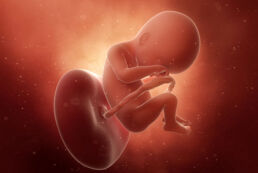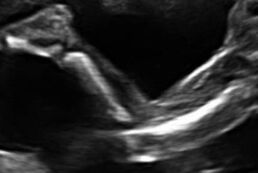Baby's Height and Weight
In the 19th week of pregnancy, the baby is 16-18 centimeters tall, the size of a pink tomato. Its weight is about 240-250 grams.
Development of the Baby

At 19 weeks of pregnancy, something important will happen in the development of the baby: the Vernix layer will begin to form on the baby’s skin surface. In the last 3 months, this layer becomes the thickest. When the baby is born, some of this layer still remains in the body. This layer protects the baby’s skin from the acidic nature of the amniotic fluid. It also makes it easier for the baby to move along the birth canal during labor.
In the 19th week of pregnancy, the baby’s entire body, including the eyelids and upper lip, was covered with a thin layer of hair (lanugo).
As muscle development continues, the 19-week-old baby becomes stronger. In the weeks since they started moving their arms, they are now able to do boxing moves and kicks much faster.In the 19th week of pregnancy, the adipose tissues continue to thicken on the baby’s skin. These adipose tissues allow it to maintain body temperature. It also helps to keep the baby warm after birth.
At 19 weeks of pregnancy, the baby’s nervous system continues to work to establish a connection between all parts of the body and the brain. This supports a rapid improvement in their senses. At the 19th week of pregnancy, your baby can now hear sounds very well. They can hear the sounds inside you, especially your heartbeat, the sounds in your stomach and intestines. At loud noises coming from outside, he/she may react in a leaping way. In addition, the sense of taste begins to develop this week. Your baby can taste the amniotic fluid.
At 19 weeks of gestation, your baby’s genitals have developed. Baby girls have produced around six million eggs this week. This number decreases to 1-2 million at birth. The baby girl’s uterus and vaginal cavity develop this week. Prostate development in male infants had been completed the previous week. His testicles have not yet descended from the abdominal cavity into the ovarian bag. During the 19th week of pregnancy, the placenta continues to grow, providing oxygen and nutrients to the baby. During this period, the placenta may be in the anterior or posterior uterine wall or in the upper part of the uterus. The placenta may also stop at the bottom during these weeks. In such a case, the doctor should check whether the placenta has moved up at 32 weeks.
Ultrasound Images

In 19-week gestational ultrasound images, the baby’s body looks much more proportional. Their legs are now longer than their arms.
Since their bones have hardened, they can now be seen more clearly in 19-week ultrasound images.
Where is the 19-week-old baby in the womb?
Babies change positions frequently during these weeks; sometimes they may stand upside down or with their head up. They move to the permanent head-down position, which will ensure comfortable delivery, after 34 weeks.
Can a 19-week-old baby's movements be felt?
In the 19th week of pregnancy, your baby continues to flip, stretch, curl and spin inside you. You may still not feel these movements if it’s your first pregnancy. And there may be a few more weeks for you to feel.
Changes in the Mother's Body
Here are the changes in the mother at 19 weeks of pregnancy…
If you still have not had it, your doctor may ask you to take the recommended Triple Test or Quadruple Test between 16-20th weeks. These tests may not be requested in pregnant women who have not been identified with any risk in the Dual Test. Even if the results of the Dual Test are normal, factors such as the age of the expectant mother and a potential genetic disorder in the family may still require these tests to be performed. In these tests, the baby’s main organs, body systems, head and spine structure, brain structure, position of the placenta, volume of amniotic fluid, baby’s heartbeat, blood vessels and gender are examined. The difference of the Quadruple Test from the Triple Test is that it is more comprehensive. Today, doctors prefer the quadruple test because it is more comprehensive. If risky situations are detected in the Triple Test or Quadruple Test, the doctor may recommend amniocentesis or other tests to the expectant mother.
Your blood volume gradually increases. Nearly 7 liters of blood are pumped from your heart per minute. However, your heart rate does not increase. The reason why your blood pressure is not affected by this condition is that your blood vessels have been enlarged since the beginning of pregnancy. The effect of progesterone and other pregnancy hormones is great in this expansion. Of course, this self-protection of the body will not always keep your blood pressure at a normal level. After an average of 30 weeks, your blood pressure may rise a little. What is normal, of course, is that it does not rise quickly and excessively.
Points need to be considered
At 19 weeks of pregnancy, it is useful to pay attention to some points:
– At 19 weeks of pregnancy, your center of gravity changes as your belly grows. You should be very careful about falling and slipping. Be careful not to be outdoors in winter, on snowy days and in freezing weather. You should also always go up and down the stairs slowly and calmly,
– Your posture may change as your belly grows. Try not to walk hunched over. If you try to walk with your shoulders upright, you will feel less pain in your back,
– Drink plenty of water to avoid getting a urinary tract infection. Wash your hands before entering the toilet,
– In the 19th week of pregnancy, your appetite may increase a lot. Avoid overeating,
– With the growth of your abdomen, cracks may occur on your skin. You can apply almond oil, cocoa butter, or coconut oil to your skin several times each day to protect it from stretch marks. You can prepare a mixture of these oils and apply this mixture to your skin,
– Be careful not to go out in the sun too much so that your pregnancy spots do not darken,
– It will be useful to consume magnesium and calcium-containing foods to prevent and reduce cramps. If you have severe cramps, your doctor may recommend a multivitamin containing these minerals,
– Throughout your pregnancy, there may be advice from your environment that you do not want to hear or superstitious suggestions for the baby’s gender prediction. Some of the advice may not be scientific. Don’t believe everything you hear, and take note of the points you’re confused about and ask your doctor. There may be comments from people you don’t know at all and even those you see for a short time while walking on the road. Don’t take them too seriously. Try looking at the fun side instead of getting angry.
Canbebe on Social Media!
Join our community of mothers and fathers on social media. Be close to caring community, sharing advices between each other on our everyday life with our baby.
